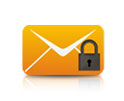Credit Union Secure Messaging – Overview

Why should a Credit Union use Secure Messaging?
If you are not concerned about sending clear text information over the internet or never send any confidential information – than secure messaging is not for you. However, if you regularly e-mail with members or customers private or critical information that you would not want to end up in the public domain – this post is for you.
What is Secure Messaging?
Secure messaging is generally an add on server or service that enables each user in the Credit Union or company to encrypt e-mail messages to outside parties. Generally the secure messaging service forces the receiving party to enter in a password or go through some process of verification before delivering the contents of the e-mail.
Top Uses
- Member Service or Call Center Representative communicating to a member via e-mail. Perhaps sending private member information like loan documentation, a social security number, PIN, or credit card number via e-mail.
- Credit Union to Vendor – perhaps you need to send critical member information between you and your outside vendor. Secure messaging can protect that data.
- Confidential Information – send data, plans, diagrams etc. to outside parties and ensure it gets delivered.
- Member e-mail to Credit Union – Perhaps your member needs to e-mail you critical documentation or proof to finish funding a loan or open an account – secure messaging ensures nobody else get’s the information.
Top Challenges
Initial Setup – We have used several different secure messaging products including Zix, Symantec’s, Global Cert and others. In general, they require the receiving party to go and setup a username and password to receive the e-mail. This can add an extra layer in the process and increase the time it takes to get the data to the receiving party.
Time between Uses – If you don’t regularly e-mail the same person and they haven’t used the account in a few months – it can be tough and frustrating to remember one more password.
Administration – Your Credit Union Technology department will have to budget, purchase, install and maintain yet another server to provide secure messaging in the organization. For a small number of users – this adds a lot of burden, distraction and cost for the Credit Union.
Is it Required by the NCUA?
No. It depends on your situation and Credit Union. Sometimes the NCUA will recommend it. Ultimately, it is governed under part 748 B rules which dictate the need to appropriately measure and take action to offset risk within your IT Security program.
Does everyone in the Credit Union need it?
In our opinion – no. All of your internal communication is secure within your LAN or Credit Union WAN. It is really only necessary for those people who send proprietary information to third parties or people who regularly e-mail with members. Since most Credit Union employees (tellers, accounting, branch employees) only e-mail internally – buying secure messaging for all users can be pretty expensive. Going with a service might allow you to purchase on a per user per month basis.
How does secure messaging work with Hosted Exchange?
In our opinion – this is a great advantage of using Hosted E-mail. With all of the e-mail related apps (smart devices, archiving, journaling, etc.) you can purchase them on a per user per month basis. Integration takes no work at all and is as simple as a check box in the secure community cloud portal.
Are you curious about the impact of hosted exchange on your Credit Union IT Department? Would you like to learn more about how to move to a hosted e-mail environment? If you would like additional information or to see if Hosted Credit Union Secure Messaging is right for your Credit Union fill out this quick form:



Welcome to the Ongoing Operations blog archive.
For our most up-to-date information, please visit ongoingoperations.com.
HOME